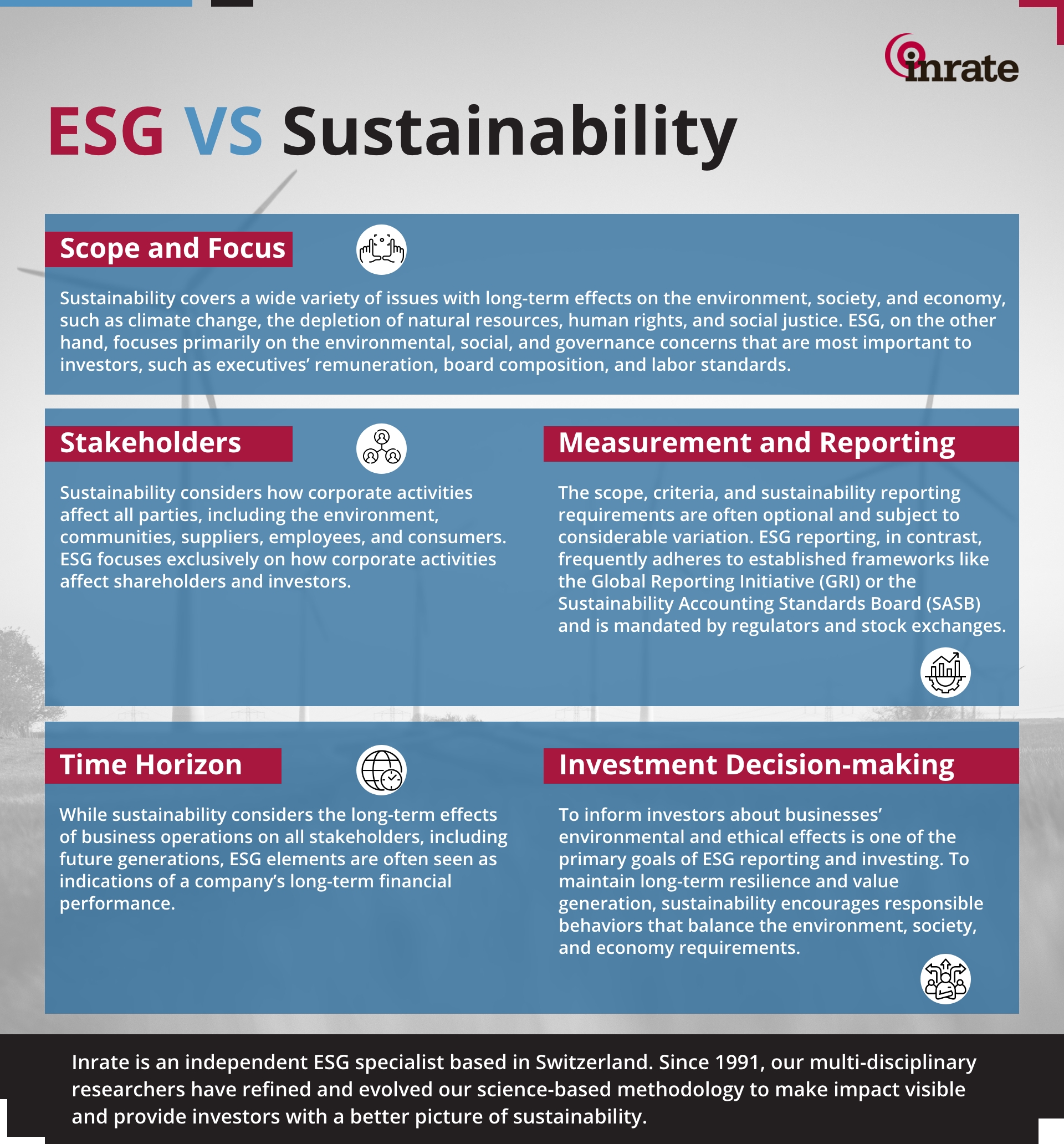There is rising interest in investing in socially conscious and ecologically sustainable businesses as the world community grows more concerned about the effects of human activities on society and the environment. As a result, two common concepts for measuring corporate sustainability have emerged: ESG and sustainability. Although the phrases are frequently used interchangeably, there are some significant points to keep in mind while comparing ESG VS Sustainability.
This blog will discuss the difference between Sustainability and ESG and why businesses and investors must understand them.
What Is ESG?
Before we learn about ESG VS sustainability, let us understand what ESG is.
ESG stands for Environmental, Social, and Governance. A framework investors use to assess the long-term viability and ethical effect of organizations in which they invest. Since more and more investors want to match their investments with their beliefs and have a good influence on society and the environment, ESG has grown in popularity in recent years.
The influence of a corporation on natural resources, greenhouse gas emissions, pollution, and waste are all environmental considerations in ESG. Social issues, including labor practices, human rights, diversity and inclusion, and community involvement, may measure a company’s effect on its employees, clients, and communities. A company’s management style, board composition, salary compensation, and transparency are all governance considerations.
Studies have shown that firms with excellent ESG performance typically outperform their competitors over the long run, so ESG considerations are becoming increasingly significant for investors. Investors are also becoming more worried about the risks connected to environmental and societal problems, including climate change, supply chain disruptions, and negative publicity.
What is Sustainability?
Sustainability is the capacity of a system to sustain its equilibrium and functionality over the long term without exhausting its resources or posing a threat to the environment or society. The term “sustainability” is frequently used in the business world to refer to the practice of satisfying current requirements without jeopardizing the capacity of future generations to meet their own needs.
Environmental, social, and economic sustainability are just a few of the many challenges that fall under the umbrella of sustainability. Reducing the adverse effects of human activity on ecosystems, natural resources, and the climate is a critical component of environmental sustainability. This entails lowering greenhouse gas emissions, protecting biodiversity, and adequately managing natural resources so that they are available to present and future generations.
Promoting social justice, human rights and universal access to opportunities and resources are all part of social sustainability. This entails ensuring secure working conditions, fostering diversity and inclusion, and helping regional communities.
Maintaining long-term financial stability and profitability while promoting sustainable development is the goal of economic sustainability. This entails investing in the study and advancement of environmentally friendly practices and technology and circular economy models that reduce waste and advance resource efficiency.
Now let us dive into ESG VS. Sustainability.

The Difference Between ESG and Sustainability
Sustainability and ESG are two different concepts, even though they aim to promote ethical and sustainable behavior. The following are the main differences between sustainability and ESG:
-
Scope and Focus
Sustainability covers a wide variety of issues with long-term effects on the environment, society, and economy, such as climate change, the depletion of natural resources, human rights, and social justice. ESG, on the other hand, focuses primarily on the environmental, social, and governance concerns that are most important to investors, such as executives’ remuneration, board composition, and labor standards. ESG is primarily concerned with the effects on shareholders and investors. In contrast, sustainability is a more comprehensive approach that considers the long-term impact of corporate activities on all stakeholders. Thanks to this more focused scope, investors may analyze firms using the essential criteria for their investment decision-making. Ultimately, even if the scope and focus of ESG and sustainability differ, they are critical for encouraging moral and ethical corporate practices. Companies and investors may better align their sustainability goals and plans by comprehending how these two notions vary.
-
Shareholders
The shareholders of ESG and sustainability are another significant distinction. Sustainability considers how corporate activities affect all parties, including the environment, communities, suppliers, employees, and consumers. Promoting ethical behavior that balances the requirements of all stakeholders, ensures long-term resilience, and generates value for our sustainability objectives.
On the other hand, ESG focuses exclusively on how corporate activities affect shareholders and investors. ESG measures a company’s environmental and ethical effects to assist investors in making better investment choices. Investors may learn how firms manage their environmental, social, and governance risks and opportunities by looking at ESG measurements and reporting standards.
Ultimately, while sustainability and ESG seek to advance ethical and sustainable business practices, their emphasis on various stakeholder groups makes them distinct. While ESG generally focuses on the impact on shareholders and investors, sustainability adopts a more comprehensive approach that considers the impact of company operations on all shareholders.
-
Measurement and Reporting
Another significant distinction is how ESG and sustainability are measured and reported. The scope, criteria, and sustainability reporting requirements are often optional and subject to considerable variation. ESG reporting, in contrast, frequently adheres to established frameworks like the Global Reporting Initiative (GRI) or the Sustainability Accounting Standards Board (SASB) and is mandated by regulators and stock exchanges.
The influence of corporate activities on the environment, society, and economy is often reflected in sustainability reporting, which typically includes a wide range of measures and indicators. These measures include greenhouse gas emissions, water consumption, waste production, employee turnover, community involvement, and product safety. The scope of sustainability reporting may change depending on the organization’s size, sector, and sustainability objectives.
On the other hand, ESG reporting usually concentrates on a smaller range of metrics and indicators that are most important to investors. These measures include carbon emissions, water management, employee diversity, executive salary, and board structure. ESG reporting frameworks are made to give investors consistent data on how businesses handle their opportunities and risks related to the environment, society, and governance.
-
Investment Decision-making
To inform investors about businesses’ environmental and ethical effects is one of the primary goals of ESG reporting and investing. A company’s long-term financial success and risk management are increasingly recognized as being influenced by ESG factors. Investors are now taking ESG factors into account when making investing decisions. Investors may use ESG data to find businesses that are better able to handle risks and take advantage of opportunities connected to environmental and social challenges. Companies with better labor practices, lower carbon emissions, or more energy efficiency may be better able to adjust to changing market conditions, consumer preferences, or legislative changes.
On the other side, sustainability approaches investment decision-making from a broader perspective. Sustainability considers how corporate activities affect not just investors but also other stakeholders. To maintain long-term resilience and value generation, sustainability encourages responsible behaviors that balance the environment, society, and economy requirements.
-
Time Horizon
Another key factor in the distinction of ESG vs. sustainability is their time horizon. While sustainability considers the long-term effects of business operations on all stakeholders, including future generations, ESG elements are often seen as indications of a company’s long-term financial performance.
A company’s long-term financial success and risk management are increasingly recognized as being influenced by ESG considerations. For instance, businesses with better labor practices, lower carbon emissions, or more energy efficiency may be better able to adjust to changing market conditions, consumer preferences, or legislative changes. Businesses with poor ESG performance may be subject to reputational, financial, or legal risks that might harm their long-term financial success.
In contrast, sustainability considers the effects of company activities on all stakeholders over a more extended period. To maintain long-term resilience and value generation, sustainability encourages responsible behaviors that balance the requirements of the environment, society, and the economy. Sustainability acknowledges that a company’s actions can influence future generations in addition to its current financial performance.

Is ESG and Sustainability the Same?
Sustainability and ESG are related but distinct concepts. However, they both emphasize ethical corporate practices, ESG, and sustainability differ in scope, focus, time horizon, and measuring methodology.
ESG is primarily concerned with how corporate activities affect stock prices and financial results. It gives information to investors on a company’s performance in three areas and stands for Environmental, Social, and Governance aspects. ESG factors are frequently included when evaluating a company’s risk and potential for long-term financial success. Investors may utilize ESG data to help them choose where to put their money with more knowledge.
Contrarily, sustainability adopts a more all-encompassing strategy, considering how corporate activities affect all stakeholders, including the environment, society, and the economy. To ensure long-term resilience and value generation, sustainability tries to encourage responsible practices that balance the requirements of all stakeholders. Inrate is a Swiss ESG and sustainability rating organization that provides data and analysis on a company’s environmental, social, and governance performance. To evaluate a company’s success in these categories and provide investors with a grade on their ESG performance, Inrate combines quantitative and qualitative data.
Want to know more about our ESG impact rating system? See Inrate’s methodology here.





